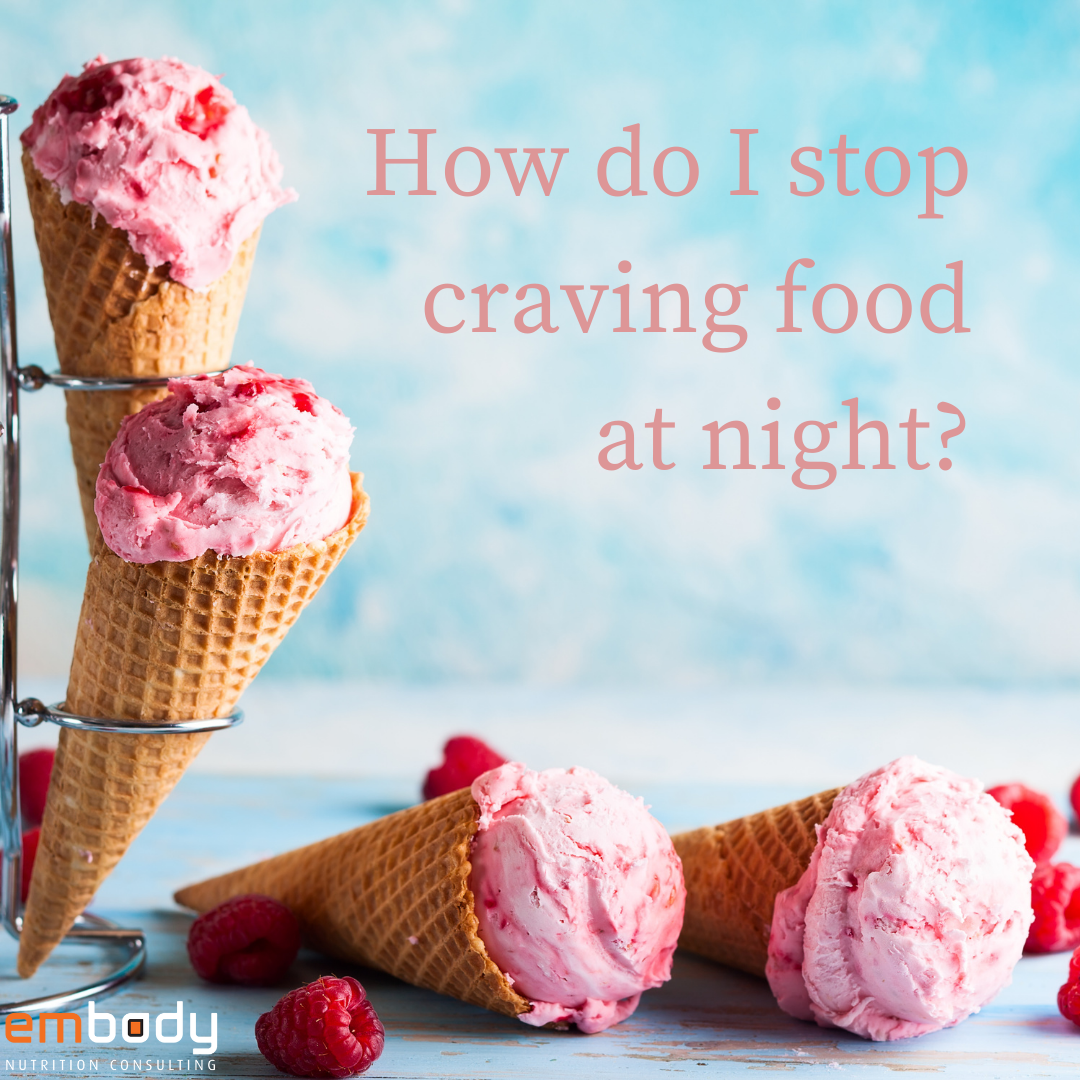I can’t tell you how common this question is, so if this is something that happens to you, just know you are not alone. More often than not, these cravings tend to be for less nutritious foods such as chocolate, biscuits, chips etc. and there are a few common reasons why you might be craving these foods at night. Let’s take a look at a few of those reasons and how you can overcome them.
1. You are hungry
One of the most common reasons that I see for people feeling the urge to eat after dinner is because they haven’t eaten enough food throughout the day. Quite often, people who chronically under eat during the day actually don’t feel very and it’s not until the night time that it seems to catch up on them.
This can make it really tricky to identify the issue because you assume you just aren’t hungry during the day! The thing with eating regularly throughout the day is that it usually starts to stimulate your appetite once you are consistent with it – and this is great thing!
Although it seems counterproductive, eating more will actually help you to have more energy, help you to manage your hunger and cravings better at night and help to fuel your activities during the day (this could be training, work, school etc).
So if you find that you are skipping meals or just not eating much throughout the day but are having trouble stopping your cravings at night, try to have some regular meals spaced across the day.
2. You haven’t eaten enough carbohydrates during the day
This is definitely the next most common culprit I see that contributes significantly to having cravings after dinner (particularly sweet cravings).
It is still quite popular in the health space (particularly in the weight loss space) to cut out carbohydrates from your diet. Yes, this will often cause some quick weight loss but this is mostly due to the loss of water from your body rather than body fat.
Carbohydrates give you energy to function throughout the day. They help your brain to work efficiently. They help you to train at a higher intensity. They also taste delicious and help make your meals really satisfying. Not to mention all the nutrients that you can get from good quality carbohydrates. So cutting them out doesn’t make a whole lot of sense to me.
I find that many people who struggle with night time cravings are either intentionally or unintentionally restricting their carbohydrate intake during the day.
By adding in some carbs with your meals and snacks throughout the day, it may become much easier to manage your night time cravings.
3. You’ve got into a habit of eating at night
Habitual eating at night can be a huge factor in you feeling like you always need to have something after dinner. This could be sweet foods or otherwise but when you’re in a habit of doing something consistently it can feel really hard to stop.
If you feel like this is you and you are simply eating because it’s a habit you have formed (and it’s not because you are hungry) then starting to be more mindful about this behaviour can be really helpful.
Start by talking yourself through the situation… ask yourself, am I hungry? Why do I want to eat this food? Am I just doing this because it’s a habit or do I really feel like having this food right now?
All of this self-talk is about gaining awareness, not necessarily needing to stop the habit right there and then but starting to understand your behaviours and taking notice of why they are happening.
Perhaps when you dig a little deeper, you are in fact hungry! Or perhaps you are stressed and this is why you are eating. Once you understand the why, then you can start to put strategies in place to manage whatever is going on for you.
Breaking a habit can be hard. If you do find that after gaining some awareness you are purely eating out of habit, then working to break that can be useful. There are a couple of ways you could try this – just know that the same thing will not work for each person so it might take a bit of trial and error.
The first is going cold turkey. This works well for some but not for others. Some people say it takes 21 days to break a habit – I’m sure this is not exactly the same for everyone but it will feel hard for a little while. The great thing is though, that the more you practice your new behaviour, the easier it becomes.
The second option could be to identify what other behaviours go alongside the eating. For example, are you always sitting on the lounge watching TV and that’s when you feel the urge to snack? Could you change this up and instead of sitting at the lounge, you might do some light stretching on the floor while watching TV instead? Or instead of TV you might read a book. Sometimes simply changing one behaviour can help you to alter another.
So the next time you are having cravings at night, start to do some detective work. Try and find out why these might be happening and then take some small steps to progress forward. If you need help navigating all of this, get in touch to see how we can help.

